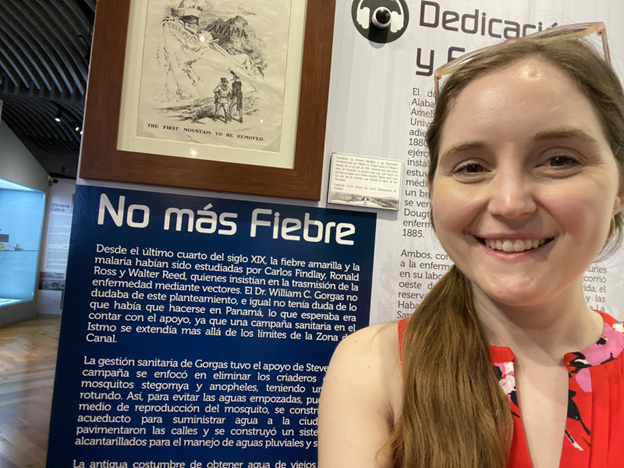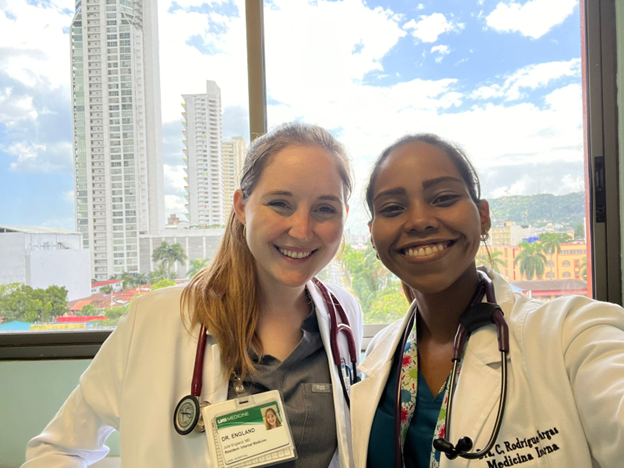 Dr. Julie England, PGY-3, in the Panama Canal Museum. The sign behind her explains Dr. Gorgas's work to combat mosquito borne illness.by Dr. Julie England, PGY-3
Dr. Julie England, PGY-3, in the Panama Canal Museum. The sign behind her explains Dr. Gorgas's work to combat mosquito borne illness.by Dr. Julie England, PGY-3
The Gorgas Global Health Clinical Scholarship Award is a co-sponsored activity by the Gorgas Memorial Institute and the UAB Internal Medicine Residency Program, Health Disparities Track. It is offered to a rising PGY-3 resident interested in global health and tropical medicine. The Gorgas Memorial Institute (GMI) was established in 1921 as a joint initiative between the U.S and Panamanian governments to study and control diseases of the tropical Americas. GMI was named in honor of Dr. William C. Gorgas, a native Alabamian and U.S. Surgeon General. In the early 1900s, Dr. Gorgas worked to control yellow fever and malaria in the Panama Canal Zone, helping protect Panama Canal workers from mosquito-borne illnesses. Dr. Gorgas became a prominent figure in public health and tropical medicine. Over one hundred years later, UAB continues to work closely with GMI. Julie England was the 2022 Gorgas Clinical Scholarship Recipient. During the month of March 2023, she studied tropical medicine with the Department of Infectious Disease at Hospital Santo Tomás in Panama City, Panama.
On my first day at Hospital Santo Tomás, I met a young woman who was intubated and sedated in the ICU. She was an immigrant from Ecuador and had traveled via the Darien jungle of Panama. In Darien, she presented to a local clinic with fever and status epilepticus. As we discussed the case, my attending, Dr. Monica Pachar, sketched a chart, “OK,” she said, “what is the differential diagnosis of a patient with fever and seizures coming from the Darien jungle?”
My fellow, Dr. Cristel Rodriguez, began listing diagnoses, and our table quickly expanded to include a wide array of bacterial, viral, fungal, and parasitic pathogens, ranging from mosquito-borne illnesses like malaria, dengue, and equine encephalitis viruses, to leptospirosis, brucella, tick-borne illnesses, helminths, and protozoans. When we examined the patient, Dr. Pachar pointed out maceration of the toes and soles of the feet, “This is very common in patients from Darien because they must travel across rivers and walk all day in wet boots.”
 Dr. Julie England and Dr. Cristel Rodriguez, Infectious Disease fellow at Hospital Santo Tomás. Cristel was an invaluable part of this rotation.
Dr. Julie England and Dr. Cristel Rodriguez, Infectious Disease fellow at Hospital Santo Tomás. Cristel was an invaluable part of this rotation.
This introduction brought tropical medicine to life for me. In my mind, malaria is no longer a circular lifecycle printed in a textbook. Malaria is a young woman trekking through a thick jungle. Leptospirosis is no longer a nebulous disease causing fever and conjunctival suffusion. It is a young immigrant walking through countless rivers in perpetually wet boots.
Now, I can recall equally vivid pictures as I think about other patients I saw - dengue/malaria coinfection, cervicofacial actinomyces, disseminated histoplasmosis, suspected echinococcus, liver abscesses, and numerous patients with HIV/tuberculosis coinfection. Hospital Santo Tomás has a ward for tuberculosis patients, many of whom have HIV coinfection and AIDS. I saw multiple presentations of pulmonary and extrapulmonary tuberculosis, including several cases of tuberculous meningitis. I learned about management of new-onset AIDS presenting with opportunistic infections, particularly tuberculosis, and the complex interplay between HIV therapy, tuberculosis therapy, and the risk of IRIS.
Some of these cases could potentially present in Alabama, including disseminated histoplasmosis, disseminated strongyloidiasis, actinomyces, and tuberculosis. However, in Panama, I saw a much higher volume of this type of case, and I experienced them through a tropical medicine lens. I learned that the differential diagnosis and approach to treatment could change dramatically depending on a patient’s geographic location, epidemiology, and risk factors/exposures. In addition, I learned about how human migration patterns through tropical areas can affect their risk of disease. Often, the most important questions we could ask our patients were, “Where do you live? Where have you traveled? Where do you get your water?”
As Dr. Gorgas demonstrated over a century ago, tropical medicine requires a solid foundation of medical knowledge and a clear understanding of the patient’s story; where they have lived; and the ecological, social, and political factors surrounding them. As our world grows more interconnected, tropical medicine will play an ever-growing role in our clinical spheres. During residency, I cared for patients who were recent immigrants from the tropical Americas. This experience gave me a stronger framework to work up, diagnose, and treat not only these patients, but all patients with potential geographic/epidemiologic exposures. I am incredibly grateful for the doctors and staff at Hospital Santo Tomás and all they have taught me this month. I look forward to continuing to work with them in the future!